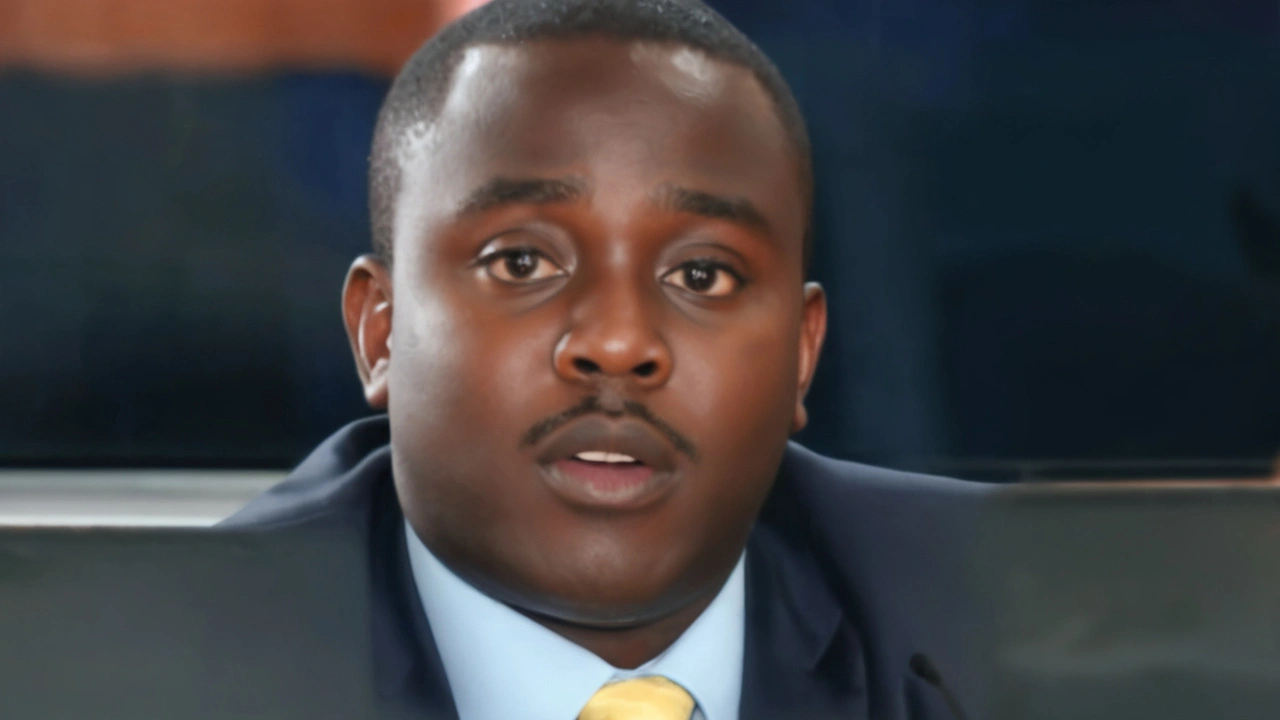Cleophas Malala Removed from UDA Secretary-General Role Amid Internal Struggles
The United Democratic Alliance (UDA) has made a significant decision to remove Cleophas Malala from his position as Secretary-General. The party's National Executive Committee (NEC) reached this decision during a crucial meeting held on August 2, 2024. According to reliable sources within the party, the NEC cited issues of performance and the pressing need for new leadership as key reasons for Malala's removal.
Cleophas Malala's tenure as Secretary-General has been anything but smooth. His time in the role has been punctuated by a series of controversies and internal conflicts that have threatened to destabilize the party. From clashing with party members to handling public relations crises, Malala's leadership has faced considerable scrutiny. These contentious issues ultimately culminated in the NEC's decision to seek a change at the top.
One of the primary reasons outlined for Malala's departure is related to his performance. Internal reports and feedback from various party members have highlighted several areas where Malala's leadership fell short of expectations. His ability to manage ongoing challenges, navigate internal divisions, and drive the party's agenda forward were all called into question. The NEC felt that fresh leadership could bring a new direction and revitalization to the party, which has faced mounting pressures both internally and externally.
In addition to performance issues, the NEC emphasized the need for new leadership within the party. The UDA has been grappling with an evolving political landscape, and many in the NEC believe that a new Secretary-General could bring a different perspective and energy needed to navigate this turbulence. Leadership changes in political parties are often undertaken to signal a renewal and to showcase the party's adaptability to changing circumstances. By removing Malala, the UDA hopes to demonstrate its commitment to addressing internal challenges head-on and to show its readiness for future electoral battles.
The decision to remove Malala has evoked mixed reactions among party members and political analysts alike. Some view it as a strategic and necessary move to revitalize the party's fortunes. They argue that Malala's tenure was riddled with problems and that the decision to replace him is timely. Others, however, are less enthusiastic about the timing and potential repercussions of the move. Concerns have been raised about the impact on party unity and whether the change could lead to further divisions within an already fragmented organization.
Political analysts have weighed in with varied opinions on the potential impact of Malala's removal. Some suggest that the move might destabilize the party in the short term but is essential for its long-term health. Others caution that the dynamics within the UDA could become even more complex, with various factions vying for influence and power. The absence of an immediate replacement for Malala's position adds another layer of uncertainty to the situation, as party insiders and external observers await the NEC's next steps.
Malala's removal also brings to the fore questions about leadership standards and accountability within political parties. His tenure sparked debates about what qualities a Secretary-General should embody and how to effectively balance internal management with public representation. The UDA's decision to seek new leadership is, therefore, not just about addressing performance issues but also about setting a precedent for the kind of leadership the party aspires to have moving forward.

What's Next for UDA?
As the UDA navigates this leadership transition, key questions remain unanswered. Who will step into the role of Secretary-General? What strategic changes will the NEC implement to ensure the party's stability and growth? These are critical issues that the UDA must address swiftly to maintain its competitive edge in the political arena.
In the meantime, party members and supporters are closely watching the unfolding events. The impact of this decision on voter perceptions and party loyalty will be pivotal in determining the UDA's trajectory in the coming months. Leadership transitions are always fraught with challenges, but they also present opportunities for renewal and reinvigoration. The UDA's ability to seize these opportunities will be crucial in defining its future path.
While the NEC has yet to announce a replacement for Malala, the search for a new Secretary-General is likely to be exhaustive. The ideal candidate will not only have to address the shortcomings observed during Malala's tenure but also inspire confidence and unity within the party ranks. This new leader will need to navigate the complex internal dynamics of the UDA while also effectively positioning the party on the national stage.
The political landscape is ever-changing, and the UDA's latest move underscores the importance of adaptability and resilience. As the party looks ahead, it faces an array of challenges and opportunities that will test its strategic vision and organizational strength. The way in which the UDA manages this transition could very well determine its success in future electoral contests and its overall relevance in the country's political discourse.

15 Comments
SAI JENA August 13 2024
While the NEC's decision marks a pivotal moment for the UDA, it also offers an opportunity for collective growth. The removal of Mr. Malala should be viewed not merely as a punitive measure but as a constructive step toward organizational renewal. I trust that party members will rally together, fostering a climate of inclusivity and mutual respect. Let us embrace this transition with optimism and a shared commitment to effective governance.
Donny Evason August 24 2024
From a broader cultural perspective, leadership turnover is a catalyst for ideological recalibration. The NEC must assert its authority while ensuring that new leadership reflects the party's diverse constituencies. It is imperative that the transition is swift, decisive, and rooted in strategic foresight. Failure to act aggressively now could erode the party's competitive edge.
Hariom Kumar September 3 2024
Incredible step forward! 🌟 This could really energize the base and bring fresh ideas. I'm feeling hopeful that the party will finally get the direction it needs. Keep the momentum going! 😊
Phillip Cullinane September 14 2024
The recent removal of Cleophas Malala as Secretary-General undeniably signals a strategic recalibration within the United Democratic Alliance.
From an organizational behavior standpoint, this decision reflects a commitment to enhancing operational efficacy and stakeholder alignment.
Empirical studies suggest that leadership turnover, when executed with transparent criteria, can restore confidence among party cadres.
The NEC’s emphasis on performance metrics indicates a data-driven approach to governance that is commendable.
However, the transition phase must be managed with meticulous change-management protocols to mitigate disruption.
It is essential that interim mechanisms are established to maintain continuity in policy development and communication pipelines.
Moreover, the recruitment of a successor should leverage competency modeling to align skill sets with the party’s strategic objectives.
Involving a cross-sectional advisory committee can also foster inclusivity and mitigate factionalism.
The internal dissent described in recent reports highlights the necessity for a cohesive narrative that unites divergent interests.
By articulating a clear vision, the NEC can harness the motivational capital of its membership base.
Communication strategies ought to incorporate both top-down directives and bottom-up feedback loops.
This dual-channel approach ensures that grassroots insights inform high-level decision making.
Additionally, the party must safeguard against reputational risks by instituting robust ethical oversight.
A systematic review of past performance failures can provide actionable lessons for future leadership.
Ultimately, the success of this transition will be measured by the party’s ability to translate structural reforms into electoral gains.
I remain optimistic that, with disciplined implementation, the UDA will emerge more resilient, innovative, and unified in its pursuit of national relevance.
Janie Siernos September 25 2024
Morally, the party's choice to hold its leaders accountable is admirable, yet the timing appears opportunistic. One must question whether the pursuit of ethical standards is being used as a political tool. Nevertheless, upholding accountability remains indispensable for institutional integrity.
joy mukherjee October 6 2024
Absolutely, accountability is the backbone of any credible organization. 😊 I think the NEC's move, while tough, could set a precedent for higher transparency. Let's hope the subsequent processes are as diligent as the decision itself.
Rob Chapman October 16 2024
Hey folks, I think it's crucial we look at the bigger picture here. Leadership change is just one piece of the puzzle, and the party's underlying values will determine its trajectory. If they can stay true to their core principles, they'll navigate this storm just fine.
Delaney Lynch October 27 2024
Indeed, staying true to core principles is essential, especially during times of upheaval, and it's clear that the NEC recognizes this necessity; however, we must also consider the practical implications of such a shake‑up, which may involve re‑negotiating alliances, reallocating resources, and recalibrating strategic priorities, all of which require careful deliberation; I look forward to seeing a comprehensive plan emerge soon!
Nicholas Mangraviti November 7 2024
Change is inevitable; embracing it wisely defines leadership.
Jared Greenwood November 17 2024
Fresh blood is the only remedy.
shubham garg November 28 2024
Yo, this whole thing is a massive wake‑up call for the UDA! They gotta step up their game, get some fresh ideas, and stop the internal drama. Let’s see them bring in real action and not just talk.
LEO MOTTA ESCRITOR December 9 2024
Honestly, I feel optimistic that this shift could spark a new era for the party. If they approach it with humility and an open mind, things could turn around nicely.
Sonia Singh December 19 2024
I’m just watching from the sidelines, and it looks like the party’s at a crossroads. It’ll be interesting to see whether they can keep their base united while navigating these changes.
Ashutosh Bilange December 30 2024
Dude, this is like a total drama fest!! I mean, who even thinks they can just yank a secretary‑general and expect everything to be chill? The whole thing is just a mess, fam, and everyone’s like ‘what now??’
Kaushal Skngh January 10 2025
The move is noteworthy, yet it feels a bit underwhelming considering the gravity of the issues at hand. A more thorough analysis would have been appreciated.